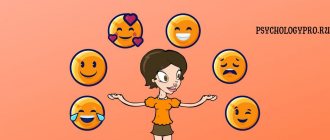Emotions accompany a person every second of his life. Sometimes they turn out to be pleasant and serve a supportive function, and sometimes they completely take over the entire thought process, making it impossible to adequately perceive reality. And in each individual case we are talking about the interaction of emotions and intellect. However, there is also such a thing as “emotional intelligence”.
Intelligence is a person’s ability to think, solve problems, process information and use new experiences for self-development. While emotions are responsible for changes in mood that are caused by external factors and stimuli. For example, bad news causes irritation and anxiety in a person, and upcoming good events invariably cause excitement. All these are factors to which the human body adapts.
A person can not be led by emotions and use them for his own benefit thanks to emotional intelligence. This term (from the English emotional intelligence) means a person’s skill in which he is aware of emotions, can manage them and even read them from himself to everyone who is part of his daily environment.
Emotional intelligence as a concept
The concept of emotional intelligence was introduced in the late 90s by US psychologist Daniel Goleman. But even before the official recognition of this term, there was also the term “social intelligence”, which meant the ability of people to adapt to their environment and calmly perceive their interlocutors, being able to hide some emotions and see what the mood of others is.
Research conducted by Goleman has shown that people who have developed emotional intelligence have good mental health, have leadership skills and are highly effective workers. At the same time, emotional intelligence is responsible for leadership skills. In professions that are directly related to stress, the ability to cope with one’s own emotions and high emotional intelligence are sometimes valued above any other knowledge.
“Change your attention and you change your emotions. Change your emotions and your attention will change.”
Frederick Dodson
Formation
Formation of EI/EQ
In general, emotional intelligence and the emotional sphere of a person’s personality are inextricably linked, therefore their formation and development occurs inextricably and almost simultaneously. It is impossible to consider the formation of one without the other, since both of these concepts come from each other and cannot be separated.
The formation of the emotional aspects of the individual’s psyche occurs from the very beginning of ontogenesis. It has been proven that even newborn children experience positive emotions when exposed to stimuli that cause a positive impact. Six-month-old children are already beginning to develop emotional patterns, which are mainly of the nature of “good-bad”, “like-dislike”.
Important!
In young children, emotions are overwhelmingly associated with the satisfaction of primitive physiological needs or sensations (hunger, pain, thirst, uncomfortable temperature).
In children older than 6 months, the psyche begins to develop at an even faster pace, and there is a significant expansion of the range of emotions. The child gradually begins to move away from the categorical concepts of “good and bad” and begins to form emotions that indicate, for example, the states of “normal”, “tolerable” or, on the contrary, “simply terrible”.
In children older than one year, mental reactions begin to form not only to organic stimuli, as was the case before, but also to social ones. For example, fear of unfamiliar faces, jealousy of mother, envy, loneliness and many others. Basically, the formation of emotional intelligence occurs due to the internal resources of the child’s psyche and is completed by the time the child’s emotional sphere becomes stable. However, the term “mentally stable” does not need to imply generally accepted balance and calm.
It is unlikely that you will expect this from a small child; here we are more likely talking about the fact that children develop a basic range of different emotions and the ability to distinguish between them. It is also important that the emerging emotional reaction adequately corresponds to the stimulus that caused it.
The development of EI occurs just the opposite due to external stimuli of the psyche. Expansion of the emotional spectrum occurs when a child encounters something new and forms his own attitude towards it. However, we will talk in detail about the development of this area in the next section.
What does emotional intelligence mean in psychology?
Today, thousands of experts consider emotional intelligence as one of the most powerful human abilities. It can be easily corrected and developed, even if initially poorly developed.
Throughout the psychological research of the 20th century, several theories about emotional intelligence have appeared. The creators, leading psychologists in the world, described the main factors that are responsible for the symbiosis of intelligence and emotional state.
Goleman's model of emotional intelligence
Daniel Goleman divides emotional intelligence into 4 components:
- Self-awareness. This is a skill that allows you to analyze human emotions and intuition. This is an awareness of which aspects of the personality are considered strong, and where the limit of possibilities is. In addition, self-awareness is characterized by a feeling for oneself and a real appreciation of one’s talents.
- Self-control. This component of emotional intelligence includes the ability to take control of destructive emotions and impulses. People with self-control are able to quickly adapt to any situation, know how to seize opportunities, have reliability and honesty, and the ability to positively assess current events.
- Social sensitivity. This component manifests itself in a special talent - to hear the feelings of others, to take their place and take part in their lives and help them. For people who are in leadership positions, sensitivity is also manifested in understanding the hierarchy in the team and the ability to satisfy the requirements of customers or subordinates
- Relationship management. This component of emotional intelligence is characterized by a trait in which a person motivates others and can force anyone to follow him. Such people have the gift of persuasion, the ability to quickly resolve disagreements in a team, maintain social connections and create teams of like-minded people.
Read more: Attention - properties and features
Goleman's model shows how important it is to encourage a person to develop his personal qualities, which subsequently contribute to achieving success in many areas.
Emotional intelligence in the Mayer-Salovey-Caruso model
US specialists Mayer and Salovey Caruso have developed their own model of emotional intelligence. Work on it has been going on for many years. But the result was a new theory that includes four components.
- Emotion assessment and perception. The authors of the concept believe that this is the essence of the development of emotional intelligence, which lies in the ability to distinguish between emotions and understand their content. To confirm their theory, psychologists gave an example of the expression of sadness or happiness on the faces of other people. These expressions are the same for all people, which means they can be recognized. Children's emotions are easy to read because they have not yet learned to hide them. Adults try to hide all emotional manifestations, but microexpressions can still give them away.
- Using emotions for self-efficacy. According to psychologists, this component consists of recognizing the power of emotions and using them to your advantage. A person learns to maintain concentration on his main tasks. With a positive attitude towards them, a person begins to work more effectively. Even a person's brain becomes more active if a person has a positive attitude.
- Understanding the emotional background. This is a person’s ability to see the cause and source of a particular emotion, to realize the difference between thoughts and emotional impulses and emotions. According to the authors of the concept, it is important for a person to learn to perceive any emotion as a data carrier. If a person is constrained by fear, he can choose how to react to it - attack, freeze with fear, or run away from it. Some emotions can be transformed. A person can also notice how to change the sensory mood with the power of thought
- Emotional background assessment. It consists in the fact that a person uses emotions as steps to achieve personal results. But in order to begin to control the emotional mood, both your own and that of other people, you need to be in a constant state of awareness; it will allow you to remain calm and observant.
In psychology, emotional intelligence is considered along with another concept that studies the relationship between the mind and emotions. It is called the emotionality coefficient, or emotional quotinent. It was introduced by psychologist and journalist Ruven Bar-On.
The scientist presented a whole structure, which consists of a symbiosis of features. All of them together become the determining factor in how a person will behave in the future. Bar-On took IQ as an example and designated the emotionality factor with the letters EQ.
The Ruven Bar-On model includes several main components:
- self-knowledge;
- people interaction skills;
- the ability to adapt to different circumstances;
- the ability to easily get out of stressful situations;
- ability to control mood.
Issues
Disturbances in the development of emotional intelligence can occur for various reasons - psychological illnesses, childhood fears, physical health problems, nervous breakdowns, lack of knowledge. If the source of problems is not identified, they can develop into serious problems.
The main aspects of human life depend on the level of development of emotional intelligence. Individuals who have learned to control their feelings achieve great heights in self-development, careers, and relationships. To reach this level, you need to analyze your condition, learn to control desires, and live without temptations.
Why emotional intelligence is important
Self-control in a world where a person is constantly accompanied by stress is a very important property. But many people get stuck at a level where emotions take precedence over reason, depriving a person of the ability to reason sensibly. And if children can be taught from infancy the skills of understanding feelings and managing emotions, then developing the emotional intelligence of adults is a more labor-intensive process. And it is important to start with the separation of feelings and emotions.
Read more: What is laziness
| Emotions | Feelings |
| An emotion is a short-term impulse with which a person reacts to external stimuli. Minor troubles cause equally minor outbursts of emotions. They flare up like a match and instantly burn out, giving way to other emotions. | Feelings are a long-term and stable attitude towards a phenomenon or person. Feelings tend to establish a close emotional attachment to an object or phenomenon, which can last for quite a long time. |
| Emotions cannot always be understood. Sometimes a person cannot understand exactly what emotion he is feeling. Often this is a whole set of different shades of the same condition. | Feelings always have a clear awareness and description. A person always understands that friendship is friendship, happiness is happiness, and love is love. |
| Emotions are difficult to hide and control. An unexpected outburst of anger or fear is sure to be reflected on the face, even if the person does not want to show it. | Feelings arise in the depths of consciousness and exist there, invisible to others. A person can hide and control them. |
Features of individuals with high EQ levels
People with a high level of emotional intelligence can be distinguished by a number of characteristics:
- They are generous and can give away their last without expecting to receive anything in return.
- They are able to switch from one object, event, experience to another. This helps you spend your energy correctly, not focus on failures, and move on.
- Constantly interested in others. They can support any conversation.
- They enjoy life and know how to enjoy little things.
- They know how to refuse temptations.
- Control their behavior in society. It is difficult to hear a curse word from such an individual. It is difficult to imagine him as a provocateur in a conflict situation.
- Such individuals do not strive for perfection.
- They often change if the situation or circumstances require it. They easily leave their comfort zone.
It's nice to communicate with such people. They have knowledge in various topics and a large vocabulary.
Components of emotional intelligence
When starting to study your own emotional intelligence, it is worth remembering that it is divided into two types: intrapersonal and interpersonal intelligence.
Intrapersonal intelligence
Essentially, this is a series of characteristics by which one can determine how a person treats himself:
- Self-awareness is the search for one’s personal abilities, awareness of the strengths and weaknesses of personality that affect others.
- Self-regulation. It lies in the ability to manage your emotional states and be able to focus on them. In addition, this skill allows you to quickly cope with stress and find solutions to complex issues.
- Self-motivation. This is the ability to recharge internally to achieve goals and the ability to maintain strength, perseverance and a positive mood when achieving a goal.
- Self-reinforcement. It consists of a good perception of oneself under any circumstances. The ability to praise yourself, your own personality and come up with rewards for yourself, always keeping a positive attitude in life in your soul.
Interpersonal or intrapersonal intelligence
This is, in fact, a whole set of skills and various abilities that form a person’s relationship with others. Basic skills:
- Empathy. It lies in the ability to hear and understand the emotions of others, to understand the motives of actions and to empathize with them. Empathy allows you to suppress conflicts before they arise. This skill is not innate; it is taught from childhood. Mandatory conditions for its development are to perceive people as they are, while being able to imagine oneself in the role of another person, without dissolving in him and maintaining one’s own individuality.
- Social skills. They allow you to positively communicate with other people, regardless of their assessments, without succumbing to rumors and their attempts to change your own decision. Also, these skills allow a person to maintain a positive attitude towards himself and protect his own interests in a conflict situation.
The ability to feel good under pressure
"Problems come from our mouths." Chinese proverb
Many of us have experienced stress in our own lives. Depending on how we manage and respond to a stressful situation, we can remain positive and active or depressed and tired. When we are under pressure, the most important thing is to keep a positive mindset. Below are a few ways to do this:
- If you feel angry and irritated towards someone, before you respond with something you will regret, take a deep breath and count slowly to ten. By now you will understand how best to respond in this case. This way you can prevent a future problem. If after counting to 10 you are still irritated, move away from the problem if possible and resolve it when you are calm and able to think rationally.
- If you are anxious and nervous, wash your face with cold water and get some fresh air. Cold temperatures slow down the passage of nerve impulses, so you can reduce anxiety. Avoid caffeinated drinks, which make you nervous.
- If you feel scared or depressed, do intense aerobics. Charge yourself. The way we use our body affects our feelings. As they say, actions are dictated by emotions. As your body's physical abilities develop, your self-confidence will also increase.
- If you're feeling overwhelmed, overwhelmed, out of sorts, walk out the door and clear your mind. Go to nature and surround yourself with green and blue colors, which have a calming effect. Find a panoramic view and look at it from a distance. Take a walk. Take a deep breath. Don't think about anything. And come back with new perspectives.
Levels of Emotional Intelligence
Each person’s level of emotional intelligence depends on the conditions of growing up, upbringing and family relationships. There can be no average values here. That is, intelligence can be either high or low. These levels are determined using the following characteristics.
A person with high emotional intelligence:
- is aware of his own emotions and can interpret them;
- knows how to behave in such a way that his emotions do not hurt others;
- strives to develop and develop inner peace;
- knows how to create a motivational mood.
Read more: Developing thinking
A person with low emotional intelligence:
- not confident in one's abilities;
- irritable and conflicted;
- does not know how to restrain emotions;
- strives to keep everyone and everything under control.
If characteristics from the second list predominate in a person’s life, this is a clear signal to begin developing oneself.
How to develop EQ in three steps
Psychologists believe that emotional intelligence, like IQ, is genetic. But unlike intelligence, EQ is much easier to develop. You can pay money and go to courses, or you can follow these three steps for free:
- Write down your emotions.
Keep a handwritten diary or note in your phone where you write down how you feel throughout the day. Focus on some specific events: analyze your state after important meetings, new acquaintances and significant events. Find the triggers that make you feel different emotions and write them down. This way you will understand how and what you react to, but don’t ask yourself why this is happening yet.
“The simplest practice is to set three reminders a day with the question “How are you feeling now?” When people begin to realize how they feel throughout the day, they make a lot of discoveries for themselves - often unpleasant ones. For example, a person notices that at work he experiences either fear or irritation. And then he realizes that he needs to start doing something in order to experience more peace. That is, first of all, you need to be aware of emotions in order to start working with them,” says Alena Aleshina.
- Find the source.
Once you understand what you feel and when, figure out why this happens. What exactly makes you angry? What about rejoicing? You need to understand the real reason for your emotions. Don't judge yourself, just understand the sources. - Manage your emotions.
Once you understand what you feel and why, move on to controlling your emotions. Think about how you can bring yourself back to a state of calm when you start to feel angry. Find something that will bring you joy in moments of sadness. Choose a mechanism that will bring you to the desired state, and constantly use it.
“We have to develop habits. You can use long exhalations, minimal physical activity, or relaxation and tension exercises. Often we use not the most constructive ways to manage emotions: eat cake, drink a couple of glasses or smoke. Find something that will really quickly calm you down or, conversely, energize you,” says Alena Aleshina.
How to use emotional intelligence
High emotional intelligence allows a person to control the entire sensory and emotional component of life. In this way, a certain balance arises. It allows a person to achieve results in all areas of life, while maintaining a sense of stability, good relationships with others and a positive attitude.
Possessing emotional intelligence allows you to keep all events and circumstances in life under control. There is a simple way to check whether this level is high. People exhibiting high EQ exhibit:
- confidence;
- curiosity;
- awareness of intentions;
- self-control;
- creativity;
- the ability to maintain communication, improve connections with people, develop empathy and love for others.
With these skills, you can use emotions as a tool to build connections and improve your sense of self.
Ability Model
There are several classifications of EI based on achieving success in most areas of life, which already distorts the assessment. Such models are subject to criticism due to the free addition of components to them that in one way or another affect success in life. Let's consider the model most used and accepted by the scientific community. It includes four main components:
- understanding emotions – the skill of identifying the source of an emotion, finding a connection between thoughts, desires and mental state, determining the moment of transition between emotions, predicting the development of an emotion in the near future and understanding complex feelings;
- perception of emotions – allows you to determine your own and others’ emotions, the reason for their appearance;
- using emotions to motivate the thought process;
- managing the emotional component of the psyche - the ability to tame, evoke and suppress one’s own emotions to obtain the desired result.
Emotional Intelligence Training
If a person still finds it difficult to control emotions, and some skills leave much to be desired, then you can independently develop emotional intelligence. To do this, you need to divide self-study into several stages.
- Study of emotions. At the first stage, it is important to understand what emotions are, how they arise, how they develop, and how they can be used for your benefit.
- Understanding the location of emotions. This stage takes quite a lot of time, but allows a person to learn to listen to himself and his own body. It often gives clues as to what kind of emotion a person is experiencing. For example, fulfillment is reflected in the chest, and anger can cause a headache.
- Regulating emotions. At the third stage, you need to learn to manage your emotions. Constant training will help with this. Chief among them is observing yourself in different situations. It is important to remember your behavior and try to change it if it is destructive.
- Learning to interact with society. This stage is mainly about developing empathy. That is, the skills of empathy for others and their support.
Managing emotions effectively requires constant practice. Various methods of developing emotional intelligence and exercises will help with this.
- Working with the body. This method allows you to control your own emotions with the help of your body, unnoticed by others. For example, clench and unclench your fists, or stand on your tiptoes several times. When it is difficult to contain emotions, these methods will help to quietly cool down the ardor and maintain calm.
- List of problems. This technique involves making a list of all the troubles that have been bothering you lately. After completing the list, you need to start solving everything written. As you decide, emotions will gradually recede into the background, and a positive attitude towards life will become the main feeling.
- Emotional motivator. This practice is designed for those who do not get along well with others. It consists of compiling a list and further implementing various methods of maintaining the spirit of excitement and fun in the team. Even if a person was previously closed and complex, then for further development it is worth taking the first step and gradually starting to open up.
Olga Figura
Development methods
If, when studying the level of development of EI, a psychologist noted delays and disturbances in the formation of feelings, he can prescribe a number of techniques to eliminate defects. The choice of correction method depends on the age of the patient.
In children
Methods for developing EI in children:
- Compass. This is a complete game that can be played by multiple children. Each child is given 8 cards on which individual feelings are indicated. One of the players must think of a situation, choose a card with an emotion that he associates with what he invented. He must place the reverse side of this card in the circle of participants so that no one knows what is written on it. The rest of the children must try to guess what feelings connect the leading player with the mystery situation.
- Making an emotional photo album. For this, the child will need a camera. You can photograph it yourself, but it’s easier to express sincere emotions alone. You need to ask your child to take pictures in different situations. He must show by his appearance what feelings he feels. Parents need to look at the pictures with their child, ask which ones he likes best and which ones cause embarrassment.
- How I feel today. This is a game in which the child must choose one of many emotions every day. To simplify the task, it is recommended to print out words with different feelings on separate sheets of paper and ask the child to color them with pencils or markers.
- Box of emotions. You need to invite the child to mentally create a box in which he can place all the emotions associated with happiness. When adding cards to a box, you need to discuss it with your child to find out why he made this choice.
- Emotions in colors. To help your child better understand what emotions are, you can invite him to make his own wall gallery, where each picture will be compared with a certain feeling. It is better that each of them was drawn by a child.
- The language of emotions. Parents need to express their feelings more often.
In adults
Other methods are used to develop EI in adults. Patients need:
- Put yourself in others' shoes more often. First you need to thoroughly study the individual whose place you want to take. This will make it easier to understand why an individual behaves this way.
- Constantly expand your horizons. Developmental disorders of EI are characteristic of individuals who cease to engage in self-development.
- Learn to name your emotions. For example, many people confuse anger with fear, disappointment with resentment. Therefore, the perception of the surrounding world and the actions of other individuals is disrupted.
- Calculate any situations in advance in order to be several steps ahead of others. You need to consider possible ways to solve the problem to find the best one.
History of the study
When did you start studying?
Even historians and scientists of the Middle Ages mentioned the role of emotional intelligence in the evolutionary development of the human collective. It was assumed that representatives of prehistoric society, having the ability to adapt to constantly changing living conditions, were able to produce the most viable offspring.
Who introduced the concept?
The term emotional intelligence was coined in the 20th century. In 1920, American psychologist Thorndike mentioned social intelligence and relationships between people of different genders and ages. A little later, the first test was developed to determine its level.
A more complete picture of it was presented in 1985 by Israeli scientist Ruven Bar-On. In his doctoral dissertation, the psychologist applied the acronym EQ (Emotional Quotient) to emotional intelligence and detailed its components in the form of a psychological scale.










